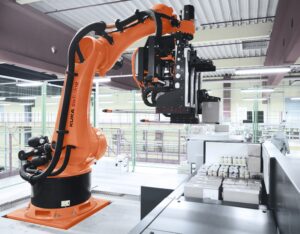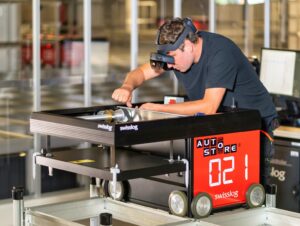
Swisslog demonstrates leadership in logistic-related systems, new solutions and innovation
Headquartered in Buchs-Aargau, Switzerland and with a local office in Dubai, Swisslog with its strong Swiss roots and legacy, is a subsidiary of the German robots manufacturer KUKA which has a workforce of more than 14,000 people working across the globe. Swisslog’s range of services includes consulting, concept studies, project implementation, customer service, cutting-edge technologies and software, all tailored to the specific requirements of a business. We stand for innovation, quality, industry-leading software and robotics technologies developed in-house.
To obtain insights and get better acquainted on the extent and eminence of its automation products and services quality, Global Supply Chain got close up and personal with Dubai-based Alain Kaddoum, General Manager, Swisslog Middle East, for a wide-ranging interview and the lowdown on the company’s automated solutions in multiple fields related to logistics and supply chain continuum.
Global Supply Chain (GSC): Give us a sense of the size and scale of your current association with the logistics & supply chain industry in the Middle East?
Alain Kaddoum (AK): Swisslog Middle East is actively and intimately associated with several companies in the Middle East
– in the UAE and Saudi Arabia but due to confidentiality clause we will not be able to reveal further their identity or the details of the projects. The projects currently in the pipeline are E-Grocery, E-Commerce, Retail and Government sector.
In the last year, we have executed some large-scale projects in the Middle East, such as automation for Almarai and Mai Dubai and a project in the banking sector to name a few that we can talk about. Also, we have successfully delivered robot-based warehouse system in retail and e-commerce for Axiom Telecom in the UAE and installed a flexible and scalable automated warehouse management system to achieve automated fulfilment operations for Maison-B-More and RoboStores, one of the largest boutique fashion retailers based in the UAE. 
Maison-B-More and RoboStores is renowned for its expertly edited fashion and stores more than 60 designer labels from across the world, including Roberto Cavalli, Just Cavalli, Dirk Bikkembergs, Philipp Plein, Iceberg, Escales Paris and many more.
To address customer demand, the luxury fashion retailer supply-chain is managed and operated by RoboStores. The company dispatches items daily with stringent cut-off times for morning and afternoon dispatches, even small inefficiency in the process can have a major impact on productivity and on the capacity of RoboStores.
Faced with limited space and increasing inventory, RoboStores needed a way to standardise its day-to-day picking across its warehouse, while ensuring high levels of security, flexibility, and efficiency. 
With the complexities of the supply management chain, RoboStores needed a sophisticated automated warehouse solution to match the reputation of its brand – one that could efficiently track, stock, pick orders and increase its distribution volume and the bottom line.
Swisslog’s AutoStore technology came as an ideal solution for RoboStores. AutoStore offers maximum storage capacity, flexibility and scalability for today’s warehouse. The AutoStore warehouse solution implemented is a unique and simple solution that is composed of a structural grid, delivery robots and storage bins to quickly process small parts orders.
It provides better use of available space than any other automated system thanks to its unique design that enables direct stacking of bins on top of each other and storage of multiple SKUs in a single bin.
GSC: How is Swisslog currently faring and how does that compare with 2019? What is your outlook for 2021?
AK: Swisslog Middle East has been receiving a lot of enquiries from businesses on how they can integrate automation technology in their existing infrastructure in a very convenient and efficient manner – without disruption to their current business processes, to remain viable and profitable, and ultimately create the future. These requests are mainly coming from E-grocery and E-commerce sector in the UAE, KSA and Kuwait. The team at Swisslog has been working non-stop consulting with retailers, customizing recommendations for each specific project and implementing automation systems since the pandemic began. 
A modular robotic automation system can be deployed in 8 to 12 months for small to medium size solutions, delivering a fast return on investment and a longer useful life due to their ability to adapt to change; taking a modular approach to roll out automation can provide important gains earlier and ease the impact of transition – this is our main focus of support to customers now – helping them adapt and be future-ready.
The Middle East is gearing up to take advantage of digitization in a big way, and we are seeing companies in the region making real investments for real results today. Swisslog’s aim will be to continue with its efforts to help businesses address the strong need to shape the future development of logistics automation. The time is ripe for automation in the Middle East. Multinational companies in particular will now further improve their supply chain management and establish robust disaster management mechanisms.
GSC: What are Swisslog’s short and long-term expansion plans for the region?
AK: Swisslog will continue to demonstrate leadership in new products and innovation aimed at embedding efficiency, intelligence, and competitive advantages into warehouse logistics operations, especially for businesses that operate in retail, e-commerce, e-grocery, pharmaceutical, F&B and governmental industries. The ease with which our solutions can be implemented without affecting the existing infrastructure is one of our major USP’s and it will definitely help us expand into various regions in the Middle East.
GSC: What are the opportunities in store and challenges confronting Swisslog in the region going forward?
AK: Covid-19 dramatically changed customer behaviour and has presented a new set of challenges for the supply chain industry.
Today a lot of businesses suffer from many challenges. Rising costs, changing consumer habits, increased operating expenses, loss in sales due to limited fulfillment capabilities add greater pressure on businesses. Though many businesses understand that, not many invest in changes. Reports show that a lot of companies are still afraid of using the latest technologies in their business operations as they assume, they are too expensive but soon this perception is going to change.
A recent survey by PwC indicated CFOs across various sectors are increasingly focused on the benefits of automation within supply chain functions as they exit the initial shock period of the coronavirus pandemic and plan forward to diminish disruption from future crises or even subsequent waves of Covid-19.
The automation market across the region is set for a paradigm shift due to digitalisation initiatives by end-user industries and the global warehouse automation market is set to grow more than 2x from 2019 to 2025, on the back of strong macro and industry growth drivers of e-commerce fulfillment and increasing warehousing labour costs.
Not surprisingly, automation is central to several GCC countries’ future development plans as the region’s logistics market is set to grow at a rate of 7.3% CAGR to a value of $66.3 billion by 2020.
GSC: How is the surge of E-commerce impacting your business?
AK: Small and big attainments in automation have made e-commerce of 2020 unrecognizable from the ecommerce of 1991. E-commerce is the fastest growing segment in the global economy. According to a recent report by Adobe Analytics, online sales this November and December are forecast to surge 33% year over year to a record US$ 189 billion.
While this means tremendous opportunity for both multi-channel retailers and pureplay e-commerce companies, competition has never been more intense. Meeting the challenges of omni-channel fulfillment operations is compounded by consumer expectations for speed, individuality and convenience, forcing retailers to rapidly adjust their supply chain concepts.
Rapid growth in e-commerce is expected to increase the demand for modern warehouses with advanced IT and digital solutions.
Moreover, an increasing number of FMCGs, which are typically a significant contributor to economic growth in the region, are expected to increase the demand for modern warehouses. This is likely to transform warehousing services in the region, specifically in areas of inventory management, cargo loading, order picking and real-time monitoring of stocks.
Some of the other trends we are witnessing are robotics; focus on supply chain visibility and orchestration; and smart last-mile fulfillment. Technology will continue to be a truly disruptive force in how the modern supply chain is shaped, defined, and explored.
From basic improvements like streamlining operations and increasing process efficiency to fully automating delivery trucks, technology is enabling much smarter, simpler supply chain management. In the future, companies will leverage new and innovative technologies to create a self-orchestrated supply chain and previously unimaginable efficiencies
The flexible and modular technologies and software in Swisslog’s Retail & E-Commerce portfolio are specifically designed to meet the dynamic needs of retail, e-commerce and multichannel logistics.
Retailers can increase the speed of order fulfillment, improve order accuracy and effectively manage an ever-increasing number of SKUs with Swisslog’s automated systems for e-commerce. Order fulfillment rates can be up to five times faster than manual systems.
Integrating automation technology and by using robots to pick and pack online orders, e-commerce retailers can bet lower prices and faster fulfilment, in turn result in accelerating demand for online shopping and creating meaningful opportunities to take market share from their competitors.
GSC: What trends do you foresee in intra-logistics automation for the region?
AK: Automation processes can be devised to tackle a lot of challenges caused by Covid-19. For example, during the pandemic the local grocery stores are witnessing rapid surge in e-grocery sales and the industry is throttled by persistent labour shortages, traditional fulfilment models, and last-mile delivery challenges. Automation can help grocers monitor the inventories in real-time and automatically notify customers once the product is back in stock.
The automated warehouse solutions and the right automation technology can help grocers move their e-grocery fulfilment beyond manual picking. Other important benefits during such challenging times is energy-saving options for businesses, smart execution of processes with higher efficiency but less spend on utilities and other crucial elements for any business.
Automation solutions for grocers can and should be customized for each business to fit their e-fulfilment strategy in the best way. When every second is valuable, such a modernization project can be actually executed on a side without disruption to the main operations, which allow business to continue its work up-skilling at the same time.
More info on https://globalsupplychainme.com/digital-issues/december-2020/






